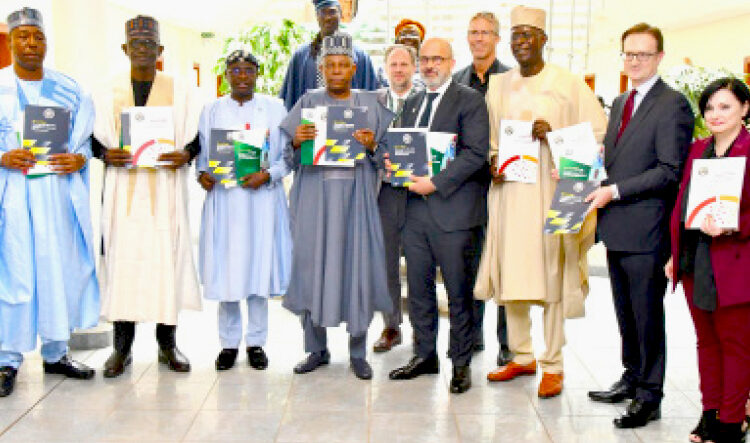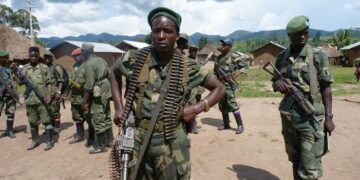Recently, the United Nations (UN) expressed its determination to give full support to a new initiative as States Action Plans for Durable Solutions in Northeast were launched to address the plight of Internally Displacement in Nigeria.
It was in furtherance of their commitment to ending internal displacement in Borno, Adamawa and Yobe States, that the Government of Nigeria and the United Nations launched this initiative, an elaborate move that attracted important dignitaries from across the country.
At the launch were the Governor of Borno State, Prof Babagana Zulum; Governor of Yobe State, Mai Mala Buni; Governor of Benue State, Rev. Fr. Hyacinth Alia; and Hon. Commissioner for Reconstruction Rehabilitation Reintegration and Human Service, Bello Hamman Diram, representing Adamawa State Governor, Ahmadu Umaru Fintiri.
During the launch held at the Presidential Villa Abuja, Robert Piper, United Nations Assistant Secretary General, and Special Adviser on Solutions to Internal Displacement, said “We will stand behind you. Let me reiterate our commitment on behalf of the United Nations: We will keep supporting on the ground; we will help rally donors; we will chase missing partners; we will celebrate your successes.”
The Action Plans, according to him, are anchored in international standards and the Kampala Convention; driven by real political leadership; and are geared to mobilize development investments.
“The plans you launch today provide a model of how governments can take responsibility for ending displacement. The plans recognise that displaced people can choose between going back home, properly integrating where they are right now or relocating elsewhere in the country,” Piper explained.
The Vice President of Nigeria, Kashim Shettima, emphasized that “We must invest in sustainable development, education, and economic opportunities to build resilient communities. By doing so, we not only address the immediate needs of the displaced but also create a foundation for a more stable and prosperous future.”
He noted that the launch of the state Action Plans was meant to craft solutions that would outlive the present generation, and offer future generations a place of hope, a home for all, and a land of opportunity where dreams could be pursued without worry.
Shettima noted, “As we launch these State Action Plans, let us commit to collaborative efforts that transcend borders and political divides. Let us harness the strength of our partnerships, both local and international, to bring about lasting change. The task ahead is immense, but with determination, unity, and a clear vision, we can make a profound difference.”
Deputy Secretary-General of the United Nations, Amina Mohammed commended the governments of Borno, Adamawa, and Yobe for their actions to scale up solution pathways in their state action plans, noting that achieving durable solutions is a priority for both Nigeria and for the United Nations secretary general.
“Finding durable solutions to internal displacement is central to achieving the sustainable development goals in Nigeria and beyond, and they must become an integral part of development plans in areas affected by forced displacement,” the Deputy Secretary-General said
It was apt that Amina Mohammed emphasized that durable solutions required long term investments in infrastructure, education, health care, as well as in security and the enablers’ social contract with the people.
Mohammed added that “Our joint efforts must offer the promise of inclusive governance, human dignity, and a world where we leave no one behind.”
The British High Commissioner to Nigeria, Richard Montgomery, who spoke on behalf of the informal North-East Ambassador Group, emphasised that the group shared a collective interest in government’s efforts to bring peace to the North- East.
“We stand in support of the Renewed Hope Agenda of the current administration. As regards the durable solutions to internal displacement in the North-east, Montgomery noted, “No one country has the answer. We must join hands to ensure sustainable solutions to internally displaced persons (IDPs) issues in Nigeria,” he said.
After the launch, it is pertinent to note that this is not the first time great initiatives have been made to salvage the situation in the northeast. The region is perhaps the most troubled in the entire north of the country because of the protracted activities of the Boko Haram terrorists. The people have been traumatized, bruised and inundated with all kinds of crises that remain unabated.
Yes, investment in education, agriculture, health and infrastructure is imperative to revamp the economy and social life of the beleaguered region, but these can only be very much possible after the region has been rid of the Boko Haram menace and the related scourge of banditry.
Internal displacement continues to be Nigeria’s primary humanitarian concern with over 2.3 million people currently living in displacement situations. This includes internally displaced persons, returnees (former IDPs) and refugees.
The north central region has also had negative impacts of displacements caused by the lingering savagery of the herders who have been in constant clashes with farmers in the region.
Ten of thousands have been killed in the north central especially in the last 9 years and many more have been displaced. As the bastion of food production in the country, displacement of farmers in the region has contributed to the severe food shortages and the grim situation facing the nation.
It is therefore imperative that concerted efforts must be made to stop the violence in northern Nigeria so that the region can experience peace that will guarantee development.





